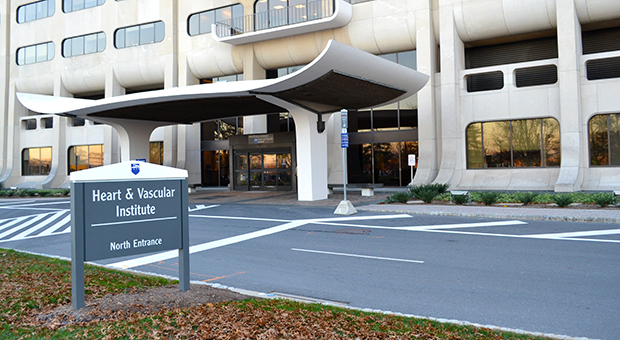Medical Center notifies open-heart surgery patients of possible infection risk

Following an internal review intended to protect the safety of its patients, Penn State Milton S. Hershey Medical Center is notifying approximately 2,300 open-heart surgery patients of possible exposure to bacteria during procedures performed between Nov. 5, 2011 and Nov. 5, 2015.
As Penn State Hershey reaches out to potentially affected patients, Medical Center clinical leaders recommend that other hospitals carefully examine the potential transmission of infection by their use of heater-cooler devices—machines used to regulate the blood temperature of patients during open heart surgical procedures. They also encourage other hospitals to perform a review of open heart surgical procedures over the last four years to determine if this unique infection has developed in any of their patients. The infections can be a challenge to find and then associate with the surgery because the delay between the procedure and the development of infection can be months to years.
“In the interest of patient safety, based on our own experience over the past several months as well as mounting clinical evidence, we recommend other hospitals carefully review their heater-cooler devices,” said Dr. Carol Freer, chief medical officer for Penn State Hershey Medical Center. “We remain concerned that our recent experience may not be unique to our hospital.”
Penn State Hershey conducts internal review
In July, Penn State Hershey Medical Center infectious disease specialists made a connection between three patients with a rare infection caused by nontuberculous mycobacterium, or NTM, being treated at the Medical Center. Penn State Hershey physicians made the discovery that patients with this infection had undergone open-heart surgery at WellSpan York Hospital and immediately notified officials at that hospital.
Based on identification of infections arising from surgery at York Hospital, along with information from a 2015 study published in the journal, Clinical Infectious Diseases, which links risk of infection to aerosolized bacteria from heater-cooler devices used during open-heart surgery, Penn State Hershey began a voluntary review of the Medical Center's own heater-cooler devices. While there have been no confirmed cases of NTM infections directly related to the Medical Center's heater-cooler devices—ongoing tests of the devices have found no evidence of NTM—its infection control specialists have identified three of approximately 2,300 open heart surgery cases in which NTM infections occurred.
After consulting with the Pennsylvania Department of Health about the Medical Center’s findings, and out of an abundance of caution, Penn State Hershey clinical leaders delayed two open-heart surgery cases at Penn State Hershey scheduled for Friday, Nov. 6, 2015 so that it could replace its existing heater-cooler devices with new devices. As of Sunday, Nov. 8, the Medical Center replaced all heater-cooler devices.
According to federal health authorities, NTM is commonly found in nature, including soil, water and even tap water. Although it typically is not harmful, in some rare cases it can cause infections in patients who have had invasive healthcare procedures, especially in people with weakened immune systems. At Penn State Hershey Medical Center, this infection has been identified in approximately one-tenth of 1 percent (0.1 percent) of patients who had open-heart surgery (three of approximately 2,300) over the past four years.
This bacterium is not contagious, and the infection can often be treated successfully once identified, according to hospital officials. However, because NTM is a slow-growing organism, it can take up to several months or more for it to develop into an infection, and sometimes years before the infection is correctly identified.
“Ensuring the safest, most high-quality care for patients is always our top priority,” said Alan Brechbill, executive director of Penn State Milton S. Hershey Medical Center. “That is why we proactively engaged state and federal health officials throughout the course of our thorough internal review, and why we continue to seek their guidance as we inform our patient and provider community.”
Penn State Hershey Medical Center has established an informational website (www.pennstatehershey.org/open-heart) as well as a toll-free call center, 1-877-467-7484, which is dedicated to answering questions from patients and the community.
No patient care providers or staff were, or are, at risk for this infection. Based on the reports of patients, the risk is believed to be limited to patients who underwent open-heart surgery at Penn State Hershey Medical Center within the past four years, up to Nov. 5, 2015. Patients who had other, non-invasive heart procedures – such as stents, pacemakers, defibrillators and ablations – are not at risk.
“We understand the concern our open-heart patients may feel upon learning of this potential risk of infection, and we are committed to providing our patients with all the information and care they need regarding this issue,” said Brechbill.
Medical Center Notifies Patients and Physicians
Two of the three patients who acquired NTM Infections, both of whom had complex medical conditions, are now deceased. Penn State Hershey has not linked the deaths of these individuals to the NTM infections. Hospital officials and physicians have made personal contact with the two patients' family members and with the third patient, who is being treated for NTM infection, to offer any additional information they may need, Brechbill said.
In addition, Penn State Hershey is in the process of sending letters to the approximately 2,300 patients who may have been exposed to this bacterium during their open-heart surgery procedure within the past four years.
“If a patient is confirmed to have an NTM infection that is associated with open-heart surgery, Penn State Hershey Medical Center will provide them with the treatment necessary for the NTM infection,” Brechbill said.
The Medical Center is also contacting area physicians and advanced practice clinicians to provide them with additional details and guidance in the monitoring and care of patients who may have been exposed to the bacteria.
If you're having trouble accessing this content, or would like it in another format, please email Penn State Health Marketing & Communications.
